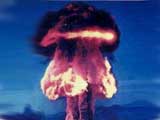|
|
TODAY.AZ / Politics
Iran says it won't suspend atomic work
02 October 2006 [21:50] - TODAY.AZ

U.S. Secretary of State Condoleezza Rice said as she flew to the Middle East that foreign ministers of the five permanent members of the U.N. Security Council and Germany might meet this week to discuss Iran. But she said there was no sign Iran would halt its atomic work.
The Security Council has threatened to impose sanctions unless Iran suspends enrichment, a process the West says could lead to Iran making nuclear bombs. Iran says its nuclear activities are aimed purely at civilian electricity generation.
"Regarding the nuclear issue, (President Mahmoud) Ahmadinejad has expressed Iran's view. Talks still continue. Ahmadinejad has said that we will not accept suspension, and we haven't accepted it," Iranian government spokesman Gholamhossein Elham told a news conference.
European Union foreign policy chief Javier Solana has been holding talks with Iran's chief nuclear negotiator Ali Larijani to try to coax Iran into suspending enrichment. No deal has been reached but further talks are planned.
The foreign ministers held a conference call over the weekend to discuss Solana's efforts.
"I think it's fair to say that we have not yet heard anything that suggests that the Iranians are going to suspend," Rice told reporters, noting that Iran's President Mahmoud Ahmadinejad had been quoted as rejecting any suspension.
"I believe that Javier Solana will probably check his sources one more time to see if there is anything more there," said Rice, speaking to reporters on a stopover in Ireland as she flew to the Middle East.
We did have a discussion of the importance of remaining firm on (U.N. Security Council) Resolution 1696, which means that if the Iranians don't suspend, then we will go to the Security Council for sanctions," she said.
Iran, the world's fourth largest oil exporter which is brimming with petrodollars, has shrugged off the threat of sanctions. Ahmadinejad has said Iran will not be deflected from its right to nuclear technology, despite Western pressure.
The president, although often Iran's most public voice, is not the most powerful figure under the Islamic Republic's system of clerical rule. The final say in state matters, including the nuclear file, lies with Supreme Leader Ayatollah Ali Khamenei. Reuters
URL: http://www.today.az/news/politics/30942.html
 Print version
Print version
Connect with us. Get latest news and updates.
See Also
- 14 January 2026 [14:37]
Pashinyan: We have formula that satisfies Armenia, US, and Azerbaijan - 14 January 2026 [12:12]
Azerbaijan launches industrial copper mining: Demirli opens up new opportunities - 13 January 2026 [14:29]
President Ilham Aliyev inspects reconstruction progress in Heyvali village, Aghdara district - 13 January 2026 [12:32]
President Ilham Aliyev attends opening of Tartar Electromechanical Plant following reconstruction - 13 January 2026 [12:12]
Trade is changing logic of Azerbaijan-Armenia relations: market before and after - 13 January 2026 [11:11]
Was it worth groveling in front of all the Solovyovs for years? - 12 January 2026 [14:14]
The Christian heritage in Azerbaijan is under reliable protection - 12 January 2026 [12:11]
President Ilham Aliyev chairs meeting on state programme to improve water supply and sanitation systems in Baku - 12 January 2026 [11:11]
Terrorist Vladimir Solovyov threatens Armenia and Central Asian countries with war - 10 January 2026 [14:46]
Azerbaijan digitizes education documents, expands access via mygov platform
Most Popular
 Terrorist Vladimir Solovyov threatens Armenia and Central Asian countries with war
Terrorist Vladimir Solovyov threatens Armenia and Central Asian countries with war
 Azerbaijan launches industrial copper mining: Demirli opens up new opportunities
Azerbaijan launches industrial copper mining: Demirli opens up new opportunities
 Defense Ministry, Military Prosecutor sign plan to prevent violations in armed forces
Defense Ministry, Military Prosecutor sign plan to prevent violations in armed forces
 Azerbaijan’s green energy push opens new opportunities for Dutch partnership
Azerbaijan’s green energy push opens new opportunities for Dutch partnership
 Trade is changing logic of Azerbaijan-Armenia relations: market before and after
Trade is changing logic of Azerbaijan-Armenia relations: market before and after
 Iran protests death toll reportedly surpasses 500
Iran protests death toll reportedly surpasses 500
 President Ilham Aliyev chairs meeting on state programme to improve water supply and sanitation systems in Baku
President Ilham Aliyev chairs meeting on state programme to improve water supply and sanitation systems in Baku
